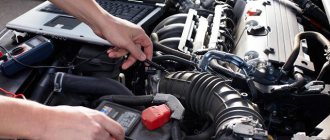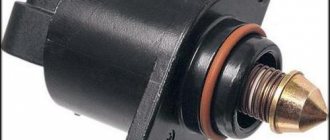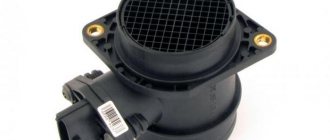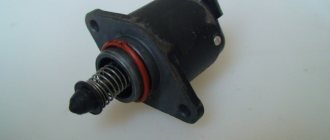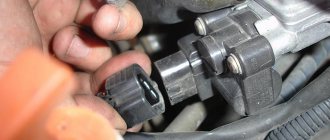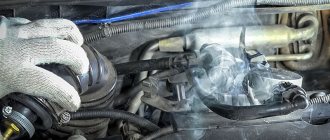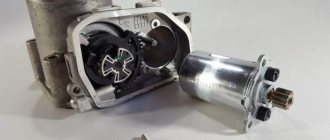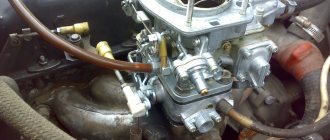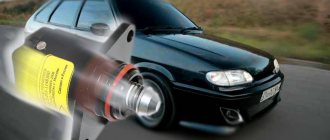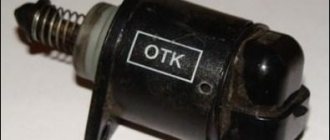Almost every owner of a domestic VAZ has encountered the problem of high idle speed. That is, when starting the engine, the speed is increased as expected, but when warming up, it does not fall below 1500 or 1000 revolutions, which is not normal. There may be several reasons for this - including a malfunctioning TPS and idle air control.
To fix the problem, you should diagnose the main components and components that affect the increase in speed.
Ways to eliminate the “sore”
How to fix the problem? For this we only need a screwdriver. Let's begin the procedure.
- By disconnecting the terminal block and also unscrewing two screws, we dismantle the assembly.
- We notice that traces of rust inside interfere with the movement of the wheel that regulates the position of the damper.
- We fill the insides of the defective device with a penetrating anti-rust aerosol.
- Use a development screwdriver to turn the wheel.
- We reassemble in reverse order.
Check to see if the engine idle speed is now high. The problem should go away.
Now let's look at another case. Let's say we have high idle speed in a VAZ 2114. This is what we do when faced with this situation.
When clarifying the circumstances of the problem under investigation, we always initially check the operation of the idle speed sensor. This device consists of a needle built inside an electromagnetic coil. The needle either moves inside the coil, moving away from the hole in the throttle pipe, or moves out, closing this hole, thereby stopping the supply of air for combustion of the mixture.
Also read about adjusting engine idle speed and repairing a Tavria car muffler with your own hands. This element is located at the throttle valve, opposite the gas pedal cable. To diagnose it, we pull out the terminal block from it, start the car, after which we see that we still have high engine speeds that have not changed at idle. Then we remove this defective unit, then clean it or replace it. For work we take:
- Unscrew the two screws. We take out the broken node.
- We connect the wiring to it. Turn on the ignition. If the needle of the device moves slightly inside the coil to the touch, then it is working.
- If the needle does not react when an electric current is applied, wash the device with a toothbrush using gasoline.
- We do the assembly in reverse order.
When you cannot restore the functionality of this unit with your own hands, it is better to purchase a new one. Moreover, the cost of spare parts is low.
Other fixes
This node can be diagnosed as follows. It is necessary to disconnect the terminal block from our mass flow regulator, and then start the engine, after which it is necessary to drive the crankshaft speed above 2000 rpm.
In this case, the emergency mode is automatically launched, portions of the mixture are now calculated only by the position of the damper. If the sensations show that the car with the disconnected sensor has become more dynamic than with the connected one, then the malfunction of this unit is obvious. To replace it, take the following tools:
- Phillips screwdriver;
- flat screwdriver.
- After turning off the engine, disconnect the wires from the mass air flow sensor.
- Loosen the clamp and remove the hose on the inlet pipe.
- We dismantle the defective device by unscrewing two bolts.
- We are replacing the device.
- We do the assembly, moving backwards point by point.
This is how this cause of high revs is eliminated.
For some reason it didn't help
Now let's look at another situation. The car owner changed, for example, the idle speed sensor, and the crankshaft speed became high, or remained high as before.
The reasons for this unpleasant phenomenon may be as follows.
- Most likely, the car enthusiast made the replacement just like that, at random, maybe it would stop turning too quickly. The real state of affairs suggests that the fault needs to be looked for elsewhere.
- If this sensor is not a completely new model, it has an adjusting bolt, it may need to be tightened in order to adjust the problem unit. Modern idle air valves do not require any additional adjustment when installed. However, for example, if the Priora has high idle speeds, then you can look for the adjusting screw on this car.
- It is possible that the new spare part was defective.
- The new spare part was installed incorrectly.
Posts 1 to 20 of 57
1 Topic by anuta8972 2015-11-15 20:20:14
- anuta8972
- New member
- Inactive
- From: Tyumen
- Registration: 2014-08-20
- Messages: 20 Thanks : 2
- Car: VAZ 21124
Topic: High rpm on warm engine (about 1400)
Hi all. Help me please. I have a VAZ 21124, 2005. I changed the pump, the rpms started jumping at idle, when the engines were warm, and the car stalled. We reset the ignition, the situation did not change. We replaced the idle speed sensor, speed sensor, crankshaft position sensor, and throttle sensor. After all the replacements, the revolutions stopped jumping, but became high, before the idle speed was 0.800, but now it is 1.400. Tell me what else I can see or change? Thank you in advance.
2 Reply from Denis Artyukhov 2015-11-15 21:12:05
- Denis Artyukhov
- Local
- Inactive
- From: Penza
- Registration: 2015-10-21
- Messages: 1,392 Thanks : 279
- Car: VAZ 21124
Re: High rpm on a warm engine (about 1400)
Is there no air leak? Even due to inattention, if you removed the throttle cable, then it can be placed in such a way that it does not allow the emergency protection to completely close.
3 Reply from kosmos 2015-11-15 22:33:21
- cosmos
- Blocked
- Inactive
- Registration: 2014-05-17
- Posts: 2,021 Thanks : 406
- Auto: 2111 - 1.5 -16v
Re: High rpm on a warm engine (about 1400)
It is necessary to check using the DMRV method https://xn--2111-43da1a8c.xn--p1ai/repea ... -dmrv.html Check all pipes and hoses for leaks, sometimes they crack and begin to leak, especially look at the hose from the receiver to the fuel pressure sensor . You can hear them skipping by bringing your head closer to the engine or visually.
4 Reply from Aleksandr.21124 2015-11-15 22:36:12
- Aleksandr.21124
- Brother-in-law
- Inactive
- Registration: 2014-08-11
- Messages: 392 Thanks : 169
- Car: VAZ 21124
Re: High rpm on a warm engine (about 1400)
anuta8972 - it is advisable to undergo diagnostics. If the DTOZ is not working properly, there will be increased speed, it is also necessary to check the connectors (chips). There may be poor contact in the sensors: IAC, TPS, MAF. If there is poor contact, there will be increased idle speed. And when replacing with a new sensor (any sensor - MAF, IAC, TPS), you need to remove the terminal from the battery and then connect it again - this is necessary to reset the ECU error. It could also be an air leak in the intake manifold (through tubes that do not fit tightly to the manifold, a rubber seal or a rubber hose to the VUT)
5 Reply from kosmos 2015-11-15 22:38:39
- cosmos
- Blocked
- Inactive
- Registration: 2014-05-17
- Posts: 2,021 Thanks : 406
- Auto: 2111 - 1.5 -16v
Re: High rpm on a warm engine (about 1400)
Aleksandr.21124 , But for some reason my ECU does not reset errors when the battery is disconnected
Although I should! With diagnostics, if you reset the error, only then will it disappear))
Source
Why might there be high idle speed?
One of the main reasons may be the failure of the IAC, the idle air regulator, which is responsible for adjusting the engine speed at idle. If the sensor is faulty. revolutions can “float”, rise and fall spontaneously. If the sensor completely fails, the car may simply stall at idle.
Also, increased speeds can be caused by a malfunction of the throttle position sensor (TPS). Over time, moisture gets under the sensor, which leads to the formation of oxide and rust on the regulator rod. To check this, you need to unscrew the sensor and carefully inspect it and the rod. If rust is found on them, they should be treated with penetrating lubricant or WD 40.
As a rule, the problem of increased speed on the VAZ 2110-12 lies precisely in these two sensors. Therefore, first of all, you need to pay attention to them.
Why does the engine speed drop when idling the VAZ 2110 injector and carburetor
Let's start with the fact that on many cars with an injector, the ECU raises the speed while the internal combustion engine is warming up. This is necessary to ensure that the power unit operates stably after a cold start.
However, after the temperature rises, the control unit reduces the idle speed, bringing it to normal. On many cars with a carburetor, the driver independently increases the speed during warm-up, using the so-called “choke”.
Moreover, after the engine is warmed up, the normal idle speed is, on average, 650-950 rpm. If you press the gas and release the accelerator, the speed should increase, and then decrease again to the specified values.
Also, a situation often arises when the speed drops slowly or is constantly kept at around 1.5 thousand rpm, 2 thousand revolutions, etc. Naturally, in such cases, consumption increases and the internal combustion engine wears out more, which indicates the need for diagnostics.
Where are the IAC and TPS sensors located?
So, first, let's check the IAC sensor. It is located on the throttle assembly below the TPS sensor. Dismantling it is very simple - remove the block from the sensor and use a Phillips screwdriver to unscrew the two bolts securing it. Then we pull out the sensor or perform diagnostics on it, read about this below.
The throttle position sensor is located above the IAC and is also secured with two bolts. It unscrews quite easily; there is no need to remove either the pipe on the throttle or the throttle itself. Disconnect the block, unscrew the two bolts and pull out the sensor.
To make sure that the problem with high speed is really in one of these sensors, and maybe in each other at once, you should diagnose them.
Reasons for floating speed on fuel-injected cars
Now let's move on to the injector. Please note that on many injection cars, after cleaning the throttle valve, the assembly also needs to be additionally “trained”. As for problems, the injection system itself is more complex, that is, there are more reasons for high speeds compared to the carburetor.
Coolant sensor - coolant
As a rule, problems with speed can be caused by problems with both mechanical elements and electronic components. In the list of main malfunctions, experts highlight malfunctions of the coolant temperature sensor, which is installed in the cooling system.
In simple words, if the specified sensor gives an incorrect signal, the ECU considers that the engine is cold and activates the warm-up mode. In this case, the control unit raises the speed so that the power unit operates stably and reaches operating temperature faster.
Idle air control - IAC
Also, problems with speed can begin due to problems and malfunctions in the operation of the IAC (idle air regulator). It also happens that the throttle cable gets stuck and becomes wedged. The spring that closes the throttle valve may also become stretched or damaged.
Air leak
Special attention should be paid to gaskets, since air leaks can lead to disruption of mixture formation. This means that you need to separately inspect manifold gaskets, injector seals, etc.
Diagnostics of the IAC sensor 2110
There are several ways to check the idle speed control. To check we need a multimeter. First, let's describe the simplest way:
IAC check method 1
- Disconnect the block from the sensor and unscrew the sensor
- Turn on the ignition
- We connect the block to the removed sensor, the needle in the sensor should move out, if not, then the sensor is faulty
IAC check method 2
- Disconnect the negative terminal of the battery
- Using a multimeter, we measure the resistance of the external and internal windings of the IAC, while the resistance parameters of contacts A and B, and C and D should be 40-80 Ohms.
- If the instrument scale is zero, it is necessary to replace the IAC with a serviceable one, and if the required parameters are obtained, we check the resistance values in pairs B and C, A and D.
- The multimeter should detect an open circuit
- With such indicators, the IAC is serviceable, and if they are absent, the regulator must be replaced.
IAC test method 3
- Disconnect the block from the sensor
- Using a voltmeter, we check the voltage - the “minus” goes to the engine, and the “plus” to the terminals of the same block of wires A and D.
- The ignition is turned on, and the received data is analyzed - the voltage should be within twelve volts, if less, then most likely there are problems with the battery charge; if there is no voltage, then you will have to check both the electronic control unit and the entire circuit.
- Then we continue the inspection with the ignition on, and analyze terminals A:B, C:D one by one - the optimal resistance will be about fifty-three ohms; During normal operation of the IAC, the resistance will be infinitely high.
Diagnostics
Signs of a malfunctioning throttle sensor on the VAZ 2110 are not too different from other models. But there are some features that are worth paying attention to. The following signs may indicate a malfunction of the TPS:
- Floating idle speed until the engine stops in neutral;
- Jerks during acceleration, the car jerks and accelerates extremely difficult;
- Check Engine
light is on .
These signs can usually indicate more than just problems with the throttle sensor. That's why drivers rush to check everything except TPS. Many people are also afraid of getting into electronic systems.
The ideal option is diagnostics using a special scanner. This allows you to recognize the cause of the phenomena without any problems. The error code can be 0122 or 0123. When the signal is low, the first code is issued, and when the signal is high, the second. Such computer readings indicate a clear problem with the sensor. Code 0122 may indicate problems with the wiring supplying the TPS.
Be sure to check all wiring for damage. If you don’t have a scanner at hand, then when checking all the elements, you should first check the throttle and its sensor.
Principle of operation
. To properly check the TPS, you need to know the features of its operation. This sensor is a potentiometer that transmits all information about the position of the throttle valve to the controller. It works as follows. By pressing the gas, you change the position of the damper, and the sensor reacts to this. There is a constant voltage at its outputs, which can vary.
The controller reads the readings from it and, based on this data, doses the fuel supply. If the TPS malfunctions, incorrect readings are given, and as a result, the fuel supply begins to be unstable. And you may notice malfunctions in the engine.
Location
. To check the device in detail, you need to find it. This is quite easy to do. In the VAZ 2110, the throttle sensor is located on the throttle pipe. It connects to the throttle shaft. This directly ensures the operation of the device. The sensor is secured with two screws.
Diagnostics of TPS VAZ 2110
To diagnose the sensor we need a voltmeter.
- It is necessary to turn on the ignition and check the voltage between the slider contact and the minus with a voltmeter. The voltmeter should read no more than 0.7 V.
- Now you need to turn the plastic sector, thereby completely opening the damper, then measure the voltage again. The device must show at least 4 V.
- Turn off the ignition and disconnect the connector from the sensor. We check the resistance between the slider contact and some terminal.
- Slowly, turning the sector, monitor the voltmeter readings. Make sure that the needle moves smoothly and slowly; if you notice jumps, the throttle position sensor is faulty and must be replaced.
Symptoms of TPS malfunction
- Deterioration of vehicle dynamics
- Floating idle speed
- Jerking during acceleration
- Increased idle speed
- The engine may stall at idle
Floating speed: reasons
Note that in some cases the revolutions do not just slowly fall or remain at the same level, but “float”. In this case, the engine may become unstable. Floating speeds first fall, then increase sharply and everything repeats. A common cause of this phenomenon is the supply of excess air, which leads to “jumps” in speed.
Such problems arise if the air supply sensor (MAF) fails, which allows the ECU to calculate how much air is supplied and how much fuel is supplied to prepare the required mixture.
Which TPS sensor to choose for replacement
For stable and long-term operation of the sensor, we advise you not to buy too cheap analogues of questionable quality. The factory installed throttle position sensor was GM 2112-1148200 .
- DPDZ /2110/ GM 2112-1148200 price from 300 rub.
- DPDZ /2110/ PEKAR 2112-1148200 price from 200 rub.
- TPDZ /2110/ StartVOLT VS-TP 0110 price from 200 rub.
- TPDZ /2110/ HOFER HF 750260 price from 150 rub.
- DPDZ /2110/ CJSC Account Mash 2112-1148200-05 price from 400 rub.
- DPDZ /2110/ JSC RIKOR ELECTRONICS 2112-1148200 price from 300 rub.
Replacing the Throttle Position Sensor on a VAZ 2110
Using a Phillips screwdriver, unscrew the two sensor mounting bolts, disconnect the block and remove the sensor.
If traces of rust or oxidation are found on the rod, which regulates the speed, it is necessary to clean it with penetrating lubricant.
Next, a new sensor is installed, the block is connected and the idle speed is checked.
Which IAC sensor to choose for replacement?
2112.1148300-04 was installed on cars 2110-12 . If for some reason you cannot buy a factory one, you can install an analogue sensor from other manufacturers.
- РХХ /2110-12/ engineer. (2112.1148300-04) factory (KZTA, Kaluga) price from 600 rub.
- РХХ /2110-12/ engineer. FENOX SIP10100O7 price from 300 rub.
- РХХ /2110-12/ engineer. HOFER HF 750381 price from 250 rub.
- РХХ /2110-12/ engineer. MANOVER MR-2112-1148 price from 350 rub.
- РХХ /2110-12/ engineer. StartVOLT VSM 0112 price from 450 rub.
Replacing the IAC sensor VAZ 2110
Disconnect the block from the sensor
Using a Phillips screwdriver, unscrew the two mounting bolts and pull out the sensor
We install the new one in the reverse order.
Similar articles:
- Idle speed sensors. IAC VAZ 2114 Malfunctions and replacement
- Diagnostics and replacement of speed sensor VAZ 2114
- Replacing the oxygen sensor Lada Granta -...
[Closed] Solved: High revs and won't go down
Topic: Resolved: High RPM and won't go down
I encountered the same problem when switching the speed to neutral or just when you give gas, the revolutions stand at about 2000 or more and do not fall. The car also jerks when you switch from 1st to 2nd gear. The car never stalls, and there is never any sign in the instrument panel megal "CHECK ENGINE". I would like to know what is the reason, the sensors? And which sensor is damaged? The THROTTLE sensor? or IDLE CONTROL?
2 Reply from Admin 2012-05-25 09:45:32
- Admin
- Administrator
- Inactive
- Registration: 2012-02-20
- Messages: 3,257 Thanks : 622
Re: Solved: High revs and won't go down
Here's about TPS, how to check what's wrong.
3 Reply from Alexander 2012-05-25 09:56:31
Re: Solved: High revs and won't go down
Here's about TPS, how to check what's wrong.
There are a few differences, for example the engine never stalled.
Added: 2012-05-25 10:56:31
but I can’t measure it, I don’t have an ohmmeter, because I’m not good with electricians ((
4 Reply from Admin 2012-05-25 10:58:45
- Admin
- Administrator
- Inactive
- Registration: 2012-02-20
- Messages: 3,257 Thanks : 622
Re: Solved: High revs and won't go down
the engine never stalled
it may not stall
try to determine by diagnosing the car or replacing the part with a known working one.
Unfortunately, it’s impossible to tell 100% from the symptoms what exactly went wrong.
5 Reply from volodyaw87 2012-05-25 14:02:14
Re: Solved: High revs and won't go down
I went for diagnostics, you can see the percentage of closing the throttle position on it.
6 Reply from Maxim 2012-05-25 17:57:44 (2012-05-25 17:58:26 edited by Maxim)
- Maxim
- Local
- Inactive
- From: Arkhangelsk region. Velsk
- Registration: 2012-03-16
- Messages: 472 Thanks : 229
- Car: VAZ 21124
Re: Solved: High revs and won't go down
Usually, when the TPS is faulty, the check light does not come on, but the symptoms are the same as you describe
When the IAC is running, you remove the chip; if it stalls or the speed remains the same, the regulator is dead. If you've grown up, good!
We put the IAC connector back on and remove the chip from the MAF, if the speed has increased, the MAF is serviceable, and if it stalls, it is dead.
We put the DPZD connector back on and remove it from the mass air flow sensor. If the engine picks up speed on its own, the TPS is working; if it stalls, it’s dead.
7 Reply from Alexander 2012-06-01 11:12:37
Re: Solved: High revs and won't go down
The problem is solved. I replaced the DPS, bought Rikor Electronics OJSC, Arzamas. I've been driving for a week so far, everything is ok.
Thanks said: Admin 1
2- failure of the injection pump and injectors (for diesel engines)
On Renault diesel engines, problems with the high pressure fuel pump are possible. If the fuel injection pump does not create the required pressure , the fuel injection system into the chamber works with errors or does not work at all.
The reason should be sought in constant refueling with bad fuel, untimely replacement of the fuel filter, and the habit of driving “with a light bulb” (when the pump collects remaining fuel along the walls of the tank along with debris).
Another reason for malfunctions in the operation of the fuel injection pump is corrosion or wear of its moving mechanical parts. In this case, the speed begins to fluctuate not only during a cold start, but also during a hot start .
fuel injectors fail , not enough fuel enters the cylinder, it is poorly distributed throughout the chamber and does not burn completely - the engine operates unstable.
Solution. Diagnostics of the condition of injectors on a special stand, repair or replacement of failed injectors. Diagnosis of the condition of the injection pump, its overhaul (difficult to find a specialist) or replacement.
Eliminating high idle speed of VAZ 2110
The problem of idle speed on domestic VAZs was one of the pressing issues for their owners during the entire period of operation of the vehicle. On various Internet forums you can often see discussions where participants complain about high or floating idle speeds . The VAZ 2110 is no exception. In this article we will look at how to quickly fix the problem of high idle speed on the engine of a VAZ 2110 car.
Let's sum it up
As you can see, in order to accurately determine why the engine speed is not reset, in many cases in-depth diagnostics may be necessary. For carburetor engines, cleaning and adjustment of the carburetor itself is often necessary, while the injector will require computer diagnostics.
If the problem is not on the surface (the throttle cable has become sour, after washing or dry cleaning, the carpet in the cabin is not installed correctly, which presses the gas pedal, etc.), then it is better to take the car to a service center.
The most complex situation is when the design of the power system involves the presence of a large number of sensors and actuators. In this case, even the use of diagnostic equipment does not always allow you to quickly and accurately determine the problem.
If diagnostics are difficult, it is optimal to deliver the car to a service that specializes in repairing a specific brand of car. As a rule, these are official dealer service stations; it is less common to find third-party organizations.
Finally, we note that timely detection of a problem allows you to save the life of the internal combustion engine and other components and assemblies. In other words, high idle speeds, floating speeds and jumps indicate that there are problems with the air/fuel supply or with mixture formation. Ignoring such problems negatively affects the engine and its service life.
Didn't find the information you are looking for? on our forum.
